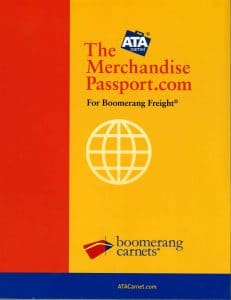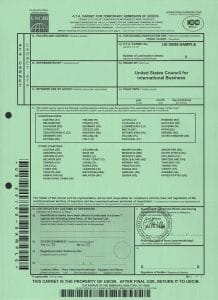CARNET: What, When and How
by David Calderwood
Senior Producer, Euro-Pacific Film & Video Productions, Inc.
Updated 3rd August, 2018
Travelling internationally with video and photographic equipment requires a great deal of extra planning and legal documentation. When entering a country with professional equipment one will usually be required to pay taxes based on the equipment’s value or to post a refundable cash bond equal to the amount of tax payable. The bond is used as security for the country’s Customs authority. If one leaves the country without the equipment, or one sells it, Customs will use the cash bond to pay the tax or import duty that is payable on the equipment. It is unlikely that one has any intention of selling a camera or leaving a lighting kit behind, but one’s word is not going to stop a diligent Customs official from doing his job; they are there to stop illegal imports.
The Carnet, which has been used internationally for nearly 50 years, allows a company to import temporarily, film, video and photographic equipment, without having to pay Customs duties or taxes. It also reduces the rigorous documentation requirements at every border post, and saves valuable time waiting at airports or border crossings.
The English translation of the French word carnet (kahr-nay) is ‘book of tickets.’ A Carnet is a book of transfer tickets: a film and video equipment passport for international travel. It must be shown to Customs officials when crossing international borders, and when entering and leaving a country. The Carnet is a bonded guarantee that the equipment listed will not be sold in the country that one is visiting. There are three basic categories of Carnet:
- Professional Equipment (PE)
- Commercial Samples (CS)
- Exhibitions & Fairs (EF)
Film, video and photographic equipment falls under the PE category which includes equipment for the press or television broadcasting; cinematographic equipment; equipment for testing or repair of machinery; or other equipment of the calling, trade or profession of a person visiting abroad to perform a specific task.
 APPLYING FOR A CARNET
APPLYING FOR A CARNET
The United States Council for International Business is the organization responsible for the guaranteeing and issuing of Admission Temporaire – Temporary Admission (ATA) Carnet in the United States. The Council is the U.S. affiliate of the Paris-based International Chamber of Commerce that administers the Carnet System internationally, and has ATA Carnet offices in eight major U.S. cities. The Corporation for International Business (CIB) now issues 8000+ Carnets annually under the brand name boomerang carnets® from its ATA Carnet Service Center in Barrington, IL. A basic fee of between $235 and $475 is charged for the Carnet, depending on the value of the equipment to be covered. The basic fee includes up to four sets of counterfoil / voucher sheets (additional sets are $20 each). The top section of the sheet is called the counterfoil and the bottom section is the voucher. Sheets are issued in sets. A ‘yellow’ set for leaving and re-entering the U.S., a ‘white’ set for entering and exiting a foreign country and a ‘blue’ (transit) set for passing through or stopping over in one country in order to enter another.
Changes that came into effect in 1992, allow production companies travelling on a Carnet, to enter the European Community and move freely between European member countries without the need of blue transit forms. The Carnet is presented at the first point of entry into the European Community and again at the final exit point. Once clearance is granted, one can travel freely within the current European Community countries (Switzerland is not a member of the EC) without the need to have the Carnet and equipment checked into and out of each country. However, with the addition of new countries, these regulations may change, so all countries that are to be visited should be listed on the Carnet and the blue transit forms carried for each country.
 A set of counterfoil / vouchers must be issued for every country that a visit is planned, for each exit and re-entry into the U.S., and for each transit. If there is a requirement for more than four sets of counterfoil / vouchers sheets, additional sets will be supplied without limit at a cost of $20.00 per set.
A set of counterfoil / vouchers must be issued for every country that a visit is planned, for each exit and re-entry into the U.S., and for each transit. If there is a requirement for more than four sets of counterfoil / vouchers sheets, additional sets will be supplied without limit at a cost of $20.00 per set.
When applying for a Carnet allow at least five working days for the application to be processed. However, if an emergency does arise, a Carnet can be processed in 24 hours at an additional charge of $100. It is important however, to call the local Carnet issuing office to check if the office is able to offer an expedited service. The Carnet application must include the security guarantee deposit and the “General List” which lists all of the equipment that is to be taken on the trip.
- The General List must include:
- A complete and specific description of each item
- The manufacturer’s name, serial and/or model number
- The country in which the equipment was originally manufactured
- The quantity of each particular item
- The total weight of each line item
- The total cost of each line item (For example: four pieces with a value of $50 each should be listed at a total value of $200.)
To avoid delays, use the commercial value (insured value) of the equipment. Do not list consumable items such as rolls of gaffer tape, gels, or a first-aid kit, as they cannot be included on the Carnet. Other important information that will be needed for the application is a list of the countries that one will visit and the countries that one will transit through. The anticipated departure date from the U.S. should also be included.
SURETY BOND
All Carnet applicants must furnish the U.S. Council with a security guarantee deposit. The amount of the guarantee deposit will be in the penalty amount of 40% of the total value of the equipment as listed on the general list. However, if going to Brazil they require a 60% bond, and India requires a 55% bond. Road vehicles exported by a company require 100% security and when exported by an individual the required bond is 150%. The security deposit is used to reimburse the U.S. Council in the event that it incurs a liability or loss in connection with the issuance of the Carnet, or its use. The security deposit will be returned, providing that the original Carnet has been returned to the U.S. Council at the conclusion of the last covered trip, it is in proper order, and no claims or costs are anticipated. When returning the Carnet, one must request in writing that the security deposit be returned or cancelled.
Although a Carnet is good for only one year, it may be necessary for the U.S. Council to hold the security deposit for up to 30 months or longer in the event that a claim has been lodged, or until any claim has been resolved. The amount of the security guarantee deposit may be in the form of a Certified Check or a Surety Bond. Companies that pay an annual fee to be a member of the U.S. Council have the option of supplying a Written Agreement (W/A) as security. Membership is only viable for companies that use a large number of Carnet each year. It is not for the one-time Carnet user.
As it is unlikely that one will want to deposit a certified check for 40% of the total value of the equipment, the best option is a Surety Bond. The premium for posting a Carnet guarantee bond through the U.S. Council instead of a certified check, is 1% of the amount of the guarantee with a minimum premium of $100. This 1% premium is of the bond amount and not the value of the equipment. For example, if the General List has equipment listed at a value of $50,000, the security deposit bond required is 40%, or $20,000. The premium for posting a Surety Bond is 1% of the $20,000, or $200. The premium is not refundable and covers the full 30 month Carnet bond period. If the applicant is an individual or a small privately held company, there will probably be a requirement to supply recent financial records before the application is approved.
A Surety Bond may also be arranged through an independent Surety Insurance company. However, the company must be on a list of Sureties that are approved by the Department of the Treasury. All guarantees must contain the same text as the U.S. Council’s Carnet guarantee form.
A security deposit is not required for Federal, State and Local Government agencies. In lieu of the security these agencies must submit a “Refundable Claim Deposit” of $250 per Carnet which will be returned if the Carnet is returned to the U.S. Council within 30 days of the expiration date and has been properly validated by each foreign Customs. The deposit is in addition to the Carnet fee.
All shipments with a value of over $2,500 will require a U.S. Department of Commerce SED or “Shippers Export Declaration” to be filed prior to departing. The U.S. Council will assist with electronically filing the SED if is required for a cost of approximately $25. A separate declaration is required for each departure from the U.S.
© 1991-2018, David Calderwood, Euro-Pacific Film & Video Productions, Inc
All Rights Reserved
Content has been revised and updated in August 2018.

 APPLYING FOR A CARNET
APPLYING FOR A CARNET